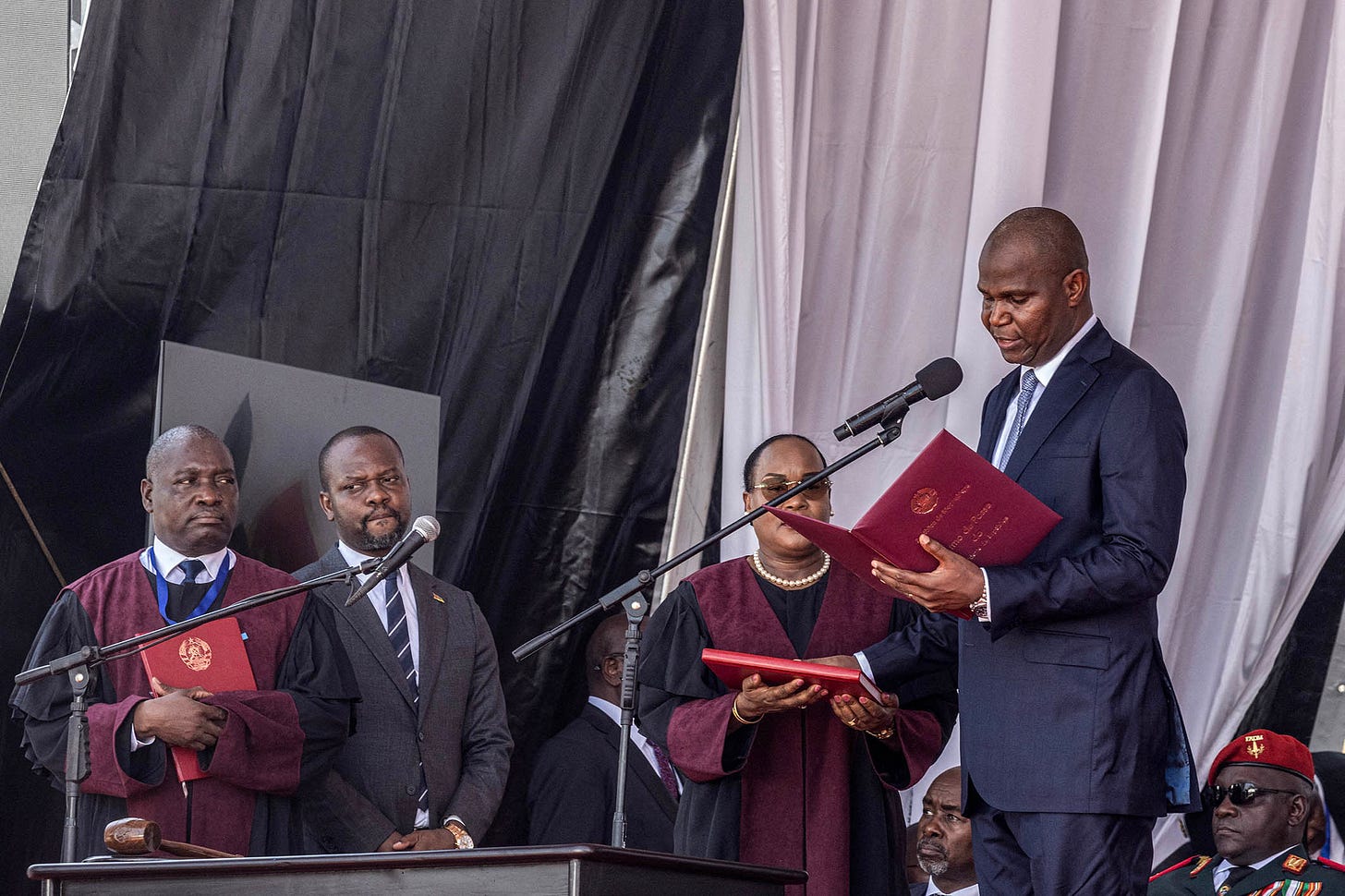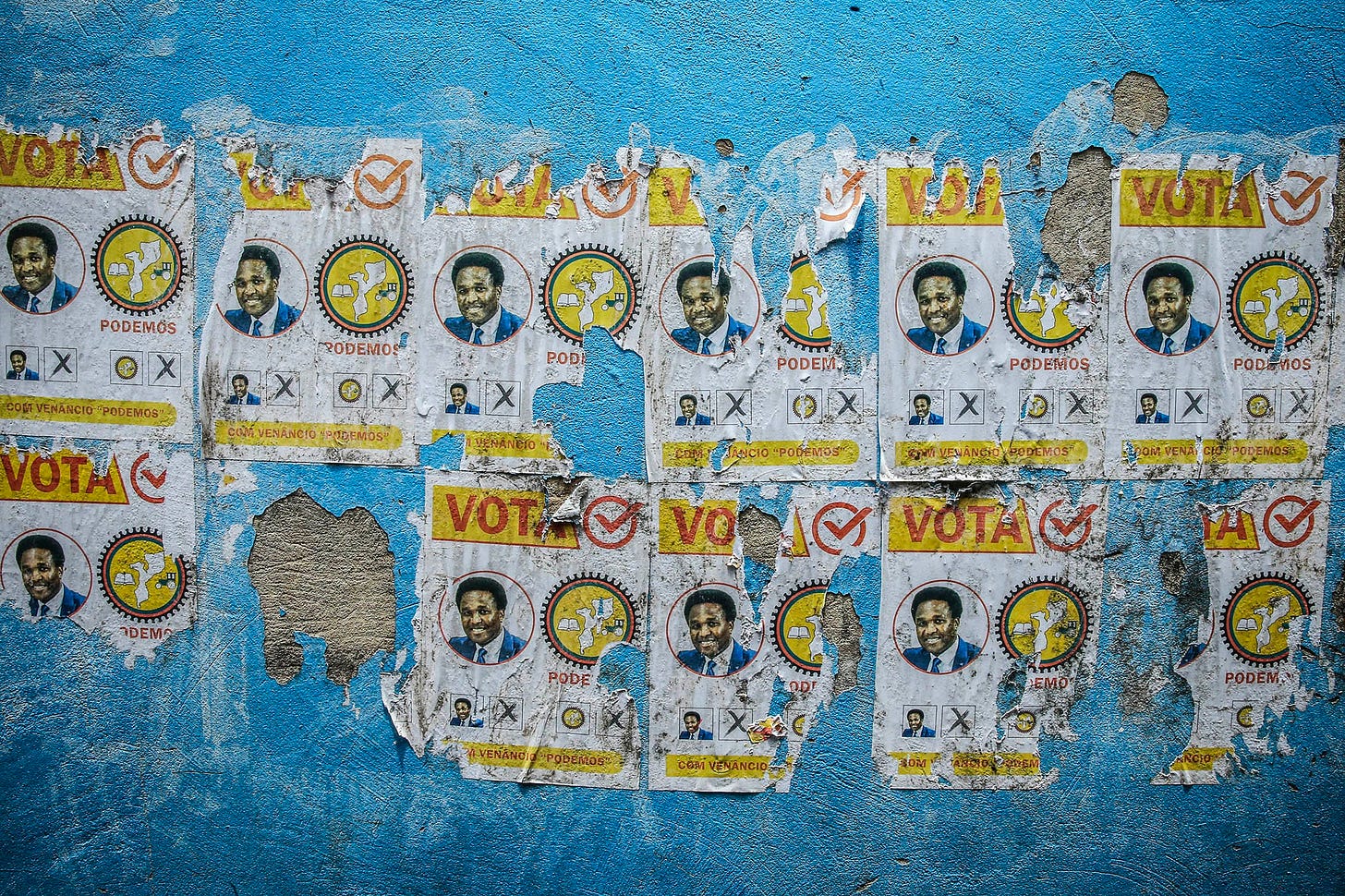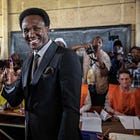The most powerful man in Mozambique
Venâncio Mondlane may not be president, but his ideas are already reshaping the country’s politics – and maybe its future.
Luis Nhachote in Maputo
The official residence of the president of Mozambique is the Palácio da Ponta Vermelha, a sweeping glass-andconcrete structure overlooking Maputo Bay. That’s where President Daniel Chapo, who was inaugurated on Wednesday last week, now lives.
Chapo’s biggest rival – and the man who many believe to be the true winner of last October’s presidential election – has set up his temporary headquarters just 1.5km away. When The Continent visits the City Lodge Hotel, where Venâncio Mondlane is living and building his shadow government, there are queues of diplomats and businessmen in the lobby, all hoping for an audience.
Mondlane’s proximity to the seat of power is a statement of intent. President Chapo may have the title, and all the trappings of office, but it is Mondlane who holds Mozambique’s future in his hands – and he knows it. “When you decide to bear a cross, depending on the size of the cross, it can be a painful thing,” he tells The Continent.
When the 51-year-old engineer-turned-politician announced his intention to run for president, on the ticket of a minor opposition party, nobody paid much attention. But his candidacy – fuelled by his own charisma and social media savvy – tapped into deep popular resentment towards the ruling party, Frelimo, and its recent history of corruption and economic mismanagement.
Frelimo have never lost an election, and according to the electoral commission they did not lose this one. Everyone else, however, had major doubts. Opposition candidates said the vote was rigged, independent observers alleged widespread electoral fraud, and Mozambicans came out in their tens of thousands to protest against the result. Mondlane, they said, was the rightful victor, and should be the next president.
These demonstrations were the most widespread and sustained anti-government protests in Mozambique’s post-independence history. The response from state security forces was brutal: Several hundred people were killed, and thousands arrested. Mondlane himself, fearing for his life, fled the country. He never stayed anywhere for long, skipping between South Africa, Germany, the Netherlands, the United Arab Emirates, Oman, Nigeria and Qatar, only returning home several months later.
His increased international profile has given him an extra degree of protection, but his life has changed irrevocably. His bank accounts have been frozen, he faces several politically-motivated lawsuits, and his employer has suspended his contract. He does not feel safe at home.
So he is here, at the City Lodge, trying to figure out how to translate his enormous popular support into real political power – and marvelling at the impact he has already had.
The copycat-in-chief
The day before the interview, Daniel Chapo was inaugurated at a subdued ceremony in the capital. Over the noise of protesters outside the venue, Chapo laid out his government’s key priorities. To Mondlane, the speech sounded... familiar.
“The general lines of governance of the appointed candidate – I’m not even going to say elected, but appointed by the constitutional council – 95% of them represent not only what I defended in the manifesto during the campaign, but also the ideas I have been advocating for the last three to four years, which are very well known and that many people even considered utopian and unachievable.”
These ideas included eliminating deputy ministers and reducing the number of ministries to save an estimated $260-million per year, and cutting some of the perks available to government officials.
The new president has also said he will introduce a new state procurement system to reduce corruption, and is pushing to digitise public services.
If implemented effectively, these measures would represent a sharp break from the past – and that is making the ruling elites nervous.
During the broadcast of the inauguration, Mondlane was carefully watching the body language of outgoing president Filipe Nyusi and his predecessor Armando Guebuza.

“I noticed a certain discomfort, an unease, among members of Frelimo regarding the measures. They were caught by surprise. They did not expect it because, naturally, it is a break from a paradigm that has lasted 50 years.”
Mondlane is sceptical however that Chapo, with whom he has worked in the past, is capable of actually delivering this paradigm shift.
“The copy is never like the original,” he says. “I do not see him having the courage to implement the measures that require bravery. Challenging that party, that monolithic machine of Frelimo, to suddenly come out and say to the line of sons, nephews of comrades, and former combatants who were already prepared to be deputy ministers, secretaries of state, permanent secretaries, and heads of inoperative institutes, to break all of this down, requires that courage.”
Impact beyond the ballot
Mondlane’s stunning challenge to the status quo of Mozambican politics has drawn comparisons to other insurgent candidates across the continent, like Ousmane Sonko and Bassirou Diomaye Faye in Senegal, who are now in power, and Peter Obi in Nigeria, who is not.
But where Obi has struggled to turn his energetic campaign into an effective opposition, Mondlane is determined to stay relevant. To do so, he is putting together a team of shadow ministers to keep the government on its toes – and is planning to use his enormous popularity to make sure the new president listens.
Ideally, this would be a collaborative rather than combative relationship: Mondlane has said that he is ready to negotiate with the government, and even to work within it in some circumstances. His ability to trigger nationwide protests with a single livestream on YouTube means that he commands considerable leverage in any such negotiation.

To bolster this position, he is also calling on his fellow citizens to avoid paying tax – threatening the state’s key revenue stream. “A large part of the taxes we have are illegal and immoral; at a certain point, they are indeed a fraud and theft from the people.”
Mondlane is also arguing for foreign mining companies to provide more direct investment into the communities where they operate. This is a major political issue, given that extractive industries – and in particular a gas find in the north worth potentially tens of billions of dollars – have been at the centre of several major corruption scandals in recent years.
It is not hyperbole to say that Mozambique’s economic future is directly linked to how equitably those resources are exploited. Mondlane wants to use his scrutiny to ensure that this windfall – the portion that has not already been squandered – is used to develop the country rather than individual families.
In this way, Mondlane hopes to be as effective outside of the presidency as he might have been within it. “If they want to copy a victory from me, let them do it by decree, however they wish,” he says. “But, from the moment they follow this, it is also a way, to a certain extent, to influence the very economic and social policy of the country in advance.”






